LAW504 Business and Corporation Law Assignment - Semester 2
VerifiedAdded on 2023/06/06
|8
|2130
|179
Homework Assignment
AI Summary
This assignment solution addresses two key issues in business and corporation law. The first question examines the liability of a promoter, Steve, for a pre-incorporation contract formed on behalf of WA Gold Exploration Company with Thor Mining Machinery Ltd. The solution analyzes the Corporations Act 2001 (Cth), focusing on Section 131 and the implications of the company's failure to rectify the contract. It also discusses Steve's limited liability as a shareholder in a later contract with Volvo Trucks (Australia) Ltd. The second question focuses on partnership law, specifically the authority of a partner, Simon, to bind other partners. The solution analyzes the Partnership Act 1892 (NSW), including Sections 5, 8, 9, and 10, and how internal agreements affect partner liability, especially in relation to contracts with Sunstar Computer Hardware Ltd and You Beaut Ute Ltd. The solution uses case law like Salomon v Salomon & Co Ltd, Mercantile Credit v Garrod, and Polkinghorne v Holland & Whitington to support its arguments.

BUSINESS AND CORPORATION
LAW
LAW
Paraphrase This Document
Need a fresh take? Get an instant paraphrase of this document with our AI Paraphraser
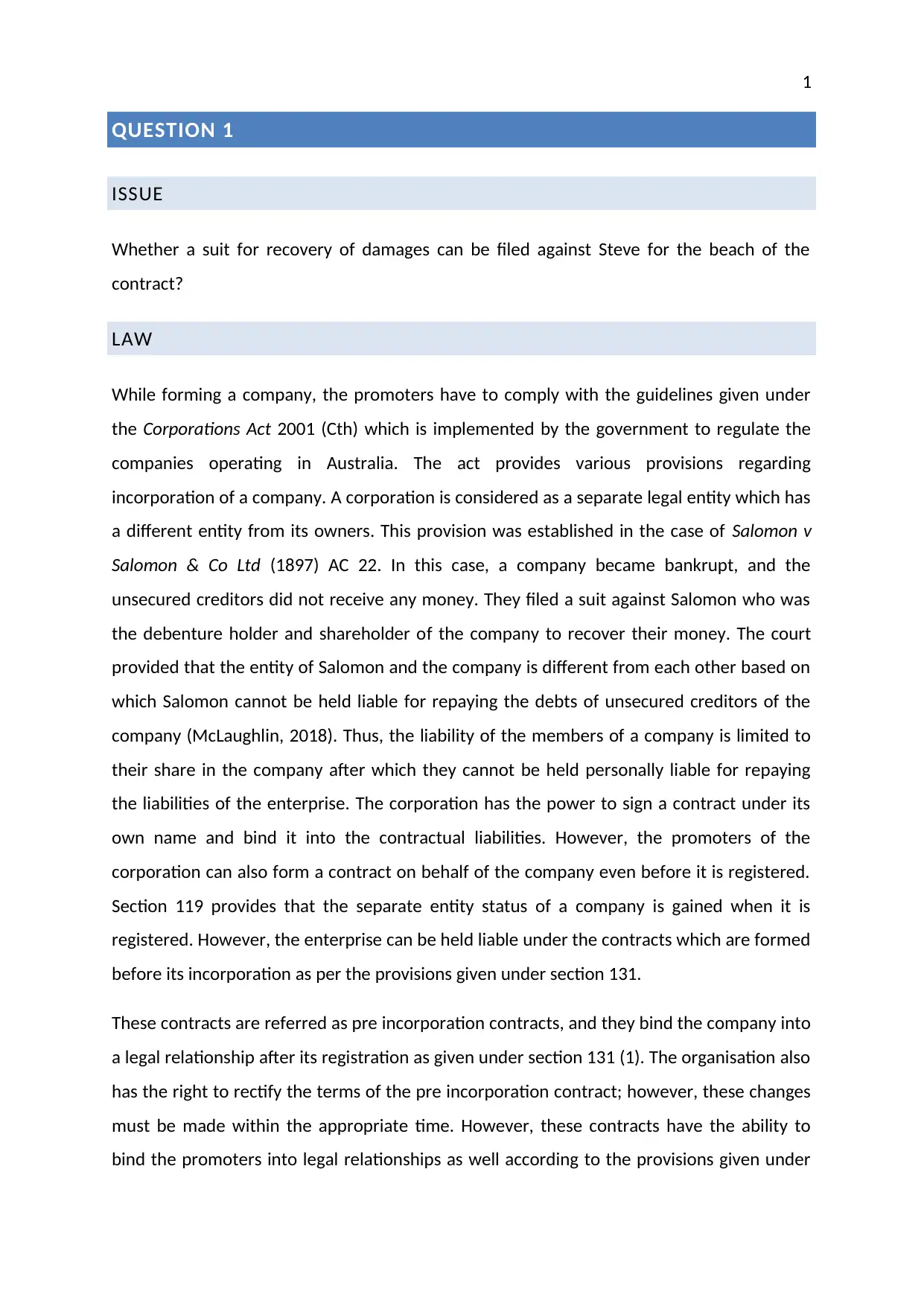
1
QUESTION 1
ISSUE
Whether a suit for recovery of damages can be filed against Steve for the beach of the
contract?
LAW
While forming a company, the promoters have to comply with the guidelines given under
the Corporations Act 2001 (Cth) which is implemented by the government to regulate the
companies operating in Australia. The act provides various provisions regarding
incorporation of a company. A corporation is considered as a separate legal entity which has
a different entity from its owners. This provision was established in the case of Salomon v
Salomon & Co Ltd (1897) AC 22. In this case, a company became bankrupt, and the
unsecured creditors did not receive any money. They filed a suit against Salomon who was
the debenture holder and shareholder of the company to recover their money. The court
provided that the entity of Salomon and the company is different from each other based on
which Salomon cannot be held liable for repaying the debts of unsecured creditors of the
company (McLaughlin, 2018). Thus, the liability of the members of a company is limited to
their share in the company after which they cannot be held personally liable for repaying
the liabilities of the enterprise. The corporation has the power to sign a contract under its
own name and bind it into the contractual liabilities. However, the promoters of the
corporation can also form a contract on behalf of the company even before it is registered.
Section 119 provides that the separate entity status of a company is gained when it is
registered. However, the enterprise can be held liable under the contracts which are formed
before its incorporation as per the provisions given under section 131.
These contracts are referred as pre incorporation contracts, and they bind the company into
a legal relationship after its registration as given under section 131 (1). The organisation also
has the right to rectify the terms of the pre incorporation contract; however, these changes
must be made within the appropriate time. However, these contracts have the ability to
bind the promoters into legal relationships as well according to the provisions given under
QUESTION 1
ISSUE
Whether a suit for recovery of damages can be filed against Steve for the beach of the
contract?
LAW
While forming a company, the promoters have to comply with the guidelines given under
the Corporations Act 2001 (Cth) which is implemented by the government to regulate the
companies operating in Australia. The act provides various provisions regarding
incorporation of a company. A corporation is considered as a separate legal entity which has
a different entity from its owners. This provision was established in the case of Salomon v
Salomon & Co Ltd (1897) AC 22. In this case, a company became bankrupt, and the
unsecured creditors did not receive any money. They filed a suit against Salomon who was
the debenture holder and shareholder of the company to recover their money. The court
provided that the entity of Salomon and the company is different from each other based on
which Salomon cannot be held liable for repaying the debts of unsecured creditors of the
company (McLaughlin, 2018). Thus, the liability of the members of a company is limited to
their share in the company after which they cannot be held personally liable for repaying
the liabilities of the enterprise. The corporation has the power to sign a contract under its
own name and bind it into the contractual liabilities. However, the promoters of the
corporation can also form a contract on behalf of the company even before it is registered.
Section 119 provides that the separate entity status of a company is gained when it is
registered. However, the enterprise can be held liable under the contracts which are formed
before its incorporation as per the provisions given under section 131.
These contracts are referred as pre incorporation contracts, and they bind the company into
a legal relationship after its registration as given under section 131 (1). The organisation also
has the right to rectify the terms of the pre incorporation contract; however, these changes
must be made within the appropriate time. However, these contracts have the ability to
bind the promoters into legal relationships as well according to the provisions given under
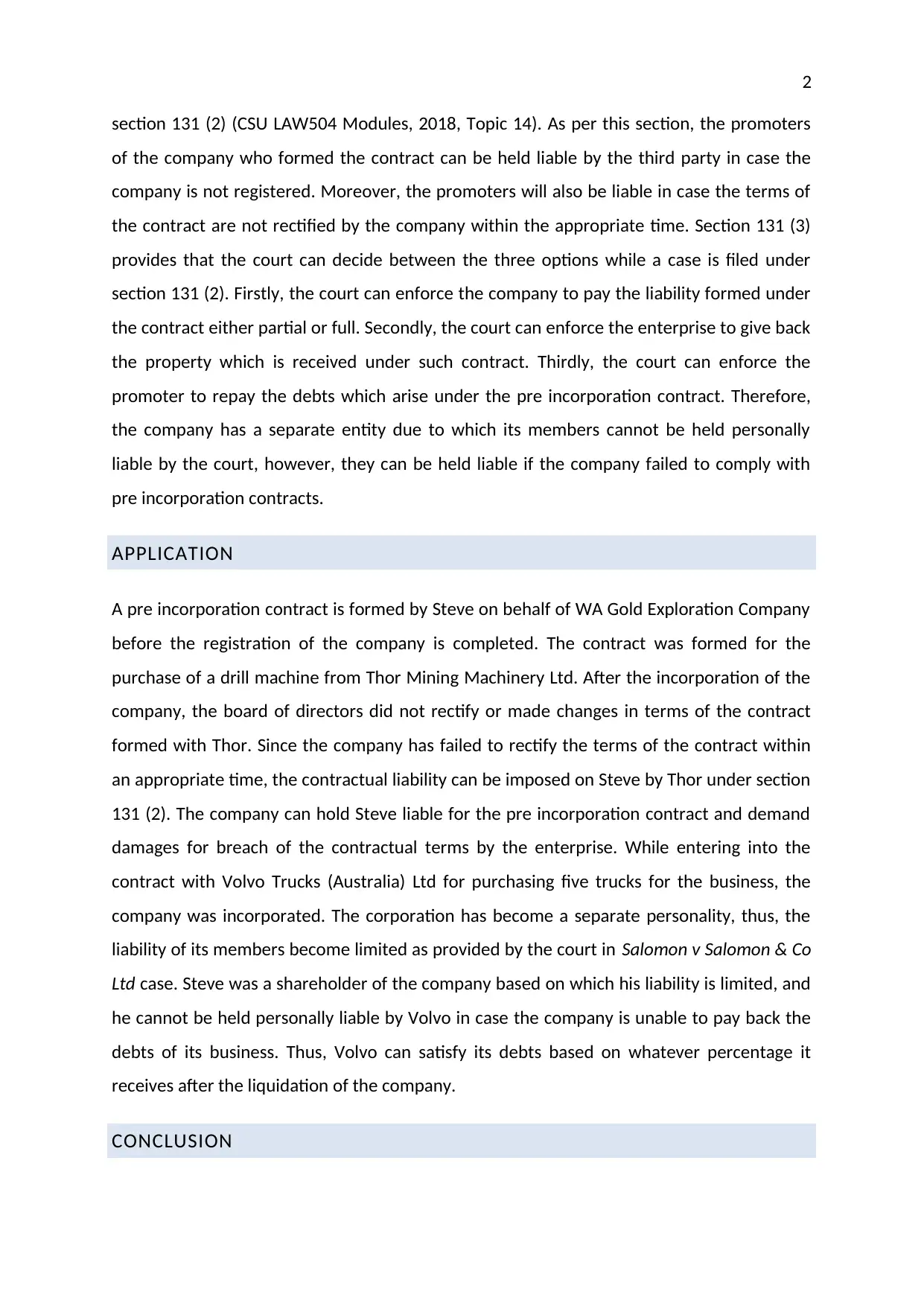
2
section 131 (2) (CSU LAW504 Modules, 2018, Topic 14). As per this section, the promoters
of the company who formed the contract can be held liable by the third party in case the
company is not registered. Moreover, the promoters will also be liable in case the terms of
the contract are not rectified by the company within the appropriate time. Section 131 (3)
provides that the court can decide between the three options while a case is filed under
section 131 (2). Firstly, the court can enforce the company to pay the liability formed under
the contract either partial or full. Secondly, the court can enforce the enterprise to give back
the property which is received under such contract. Thirdly, the court can enforce the
promoter to repay the debts which arise under the pre incorporation contract. Therefore,
the company has a separate entity due to which its members cannot be held personally
liable by the court, however, they can be held liable if the company failed to comply with
pre incorporation contracts.
APPLICATION
A pre incorporation contract is formed by Steve on behalf of WA Gold Exploration Company
before the registration of the company is completed. The contract was formed for the
purchase of a drill machine from Thor Mining Machinery Ltd. After the incorporation of the
company, the board of directors did not rectify or made changes in terms of the contract
formed with Thor. Since the company has failed to rectify the terms of the contract within
an appropriate time, the contractual liability can be imposed on Steve by Thor under section
131 (2). The company can hold Steve liable for the pre incorporation contract and demand
damages for breach of the contractual terms by the enterprise. While entering into the
contract with Volvo Trucks (Australia) Ltd for purchasing five trucks for the business, the
company was incorporated. The corporation has become a separate personality, thus, the
liability of its members become limited as provided by the court in Salomon v Salomon & Co
Ltd case. Steve was a shareholder of the company based on which his liability is limited, and
he cannot be held personally liable by Volvo in case the company is unable to pay back the
debts of its business. Thus, Volvo can satisfy its debts based on whatever percentage it
receives after the liquidation of the company.
CONCLUSION
section 131 (2) (CSU LAW504 Modules, 2018, Topic 14). As per this section, the promoters
of the company who formed the contract can be held liable by the third party in case the
company is not registered. Moreover, the promoters will also be liable in case the terms of
the contract are not rectified by the company within the appropriate time. Section 131 (3)
provides that the court can decide between the three options while a case is filed under
section 131 (2). Firstly, the court can enforce the company to pay the liability formed under
the contract either partial or full. Secondly, the court can enforce the enterprise to give back
the property which is received under such contract. Thirdly, the court can enforce the
promoter to repay the debts which arise under the pre incorporation contract. Therefore,
the company has a separate entity due to which its members cannot be held personally
liable by the court, however, they can be held liable if the company failed to comply with
pre incorporation contracts.
APPLICATION
A pre incorporation contract is formed by Steve on behalf of WA Gold Exploration Company
before the registration of the company is completed. The contract was formed for the
purchase of a drill machine from Thor Mining Machinery Ltd. After the incorporation of the
company, the board of directors did not rectify or made changes in terms of the contract
formed with Thor. Since the company has failed to rectify the terms of the contract within
an appropriate time, the contractual liability can be imposed on Steve by Thor under section
131 (2). The company can hold Steve liable for the pre incorporation contract and demand
damages for breach of the contractual terms by the enterprise. While entering into the
contract with Volvo Trucks (Australia) Ltd for purchasing five trucks for the business, the
company was incorporated. The corporation has become a separate personality, thus, the
liability of its members become limited as provided by the court in Salomon v Salomon & Co
Ltd case. Steve was a shareholder of the company based on which his liability is limited, and
he cannot be held personally liable by Volvo in case the company is unable to pay back the
debts of its business. Thus, Volvo can satisfy its debts based on whatever percentage it
receives after the liquidation of the company.
CONCLUSION
⊘ This is a preview!⊘
Do you want full access?
Subscribe today to unlock all pages.

Trusted by 1+ million students worldwide

3
Conclusively, the contract formed by Steve for WA with Thor was a pre incorporation
contract, and since the enterprise failed to rectify its terms within the given time, Thor can
file a suit against Steve to hold him personally liable to pay back the debts of the company.
However, since Steve was a shareholder and the contract between WA and Volvo was made
after the incorporation of the company, Volvo did not have the right to sue Steve for the
breach of the contract and recover damages.
Conclusively, the contract formed by Steve for WA with Thor was a pre incorporation
contract, and since the enterprise failed to rectify its terms within the given time, Thor can
file a suit against Steve to hold him personally liable to pay back the debts of the company.
However, since Steve was a shareholder and the contract between WA and Volvo was made
after the incorporation of the company, Volvo did not have the right to sue Steve for the
breach of the contract and recover damages.
Paraphrase This Document
Need a fresh take? Get an instant paraphrase of this document with our AI Paraphraser
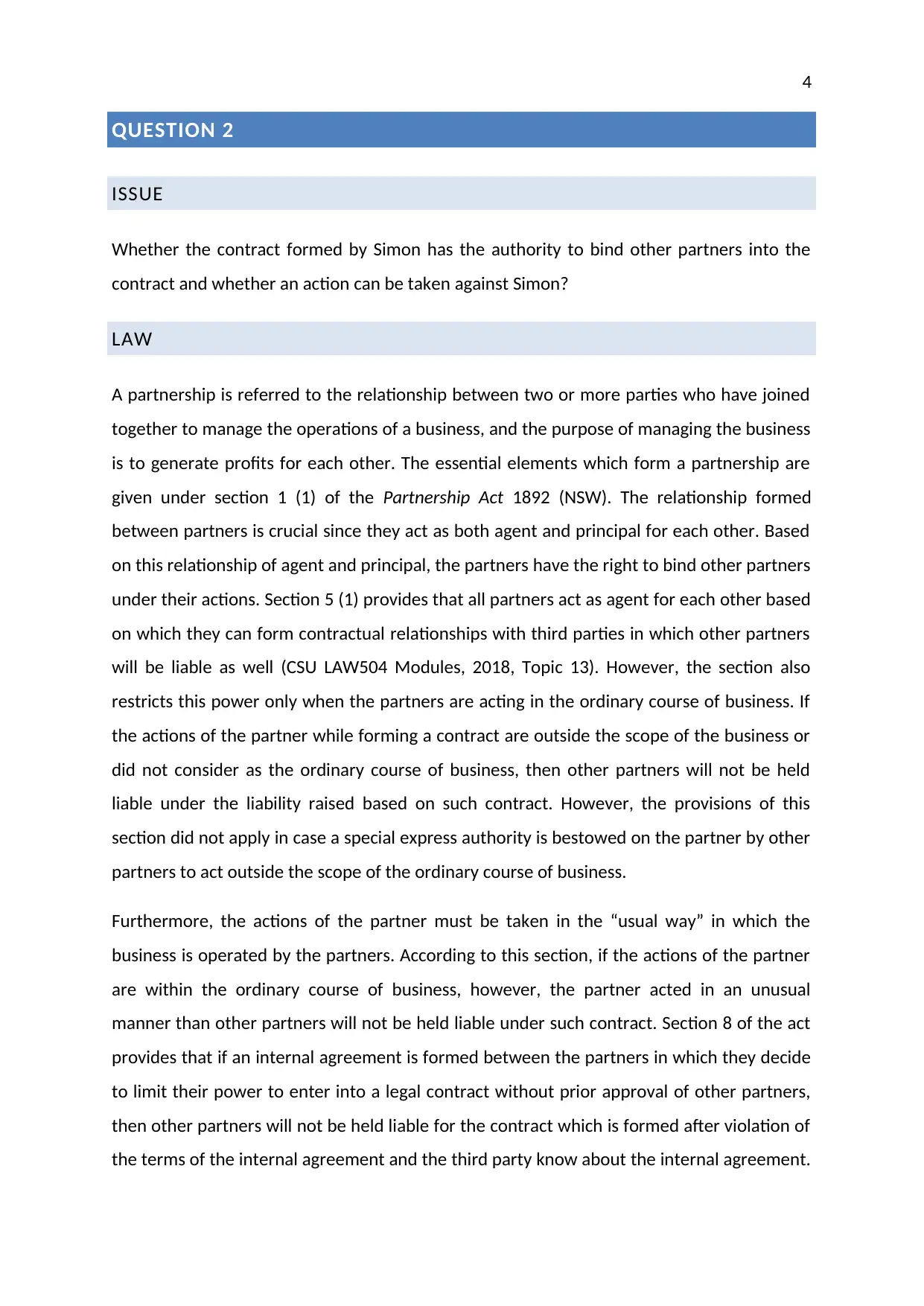
4
QUESTION 2
ISSUE
Whether the contract formed by Simon has the authority to bind other partners into the
contract and whether an action can be taken against Simon?
LAW
A partnership is referred to the relationship between two or more parties who have joined
together to manage the operations of a business, and the purpose of managing the business
is to generate profits for each other. The essential elements which form a partnership are
given under section 1 (1) of the Partnership Act 1892 (NSW). The relationship formed
between partners is crucial since they act as both agent and principal for each other. Based
on this relationship of agent and principal, the partners have the right to bind other partners
under their actions. Section 5 (1) provides that all partners act as agent for each other based
on which they can form contractual relationships with third parties in which other partners
will be liable as well (CSU LAW504 Modules, 2018, Topic 13). However, the section also
restricts this power only when the partners are acting in the ordinary course of business. If
the actions of the partner while forming a contract are outside the scope of the business or
did not consider as the ordinary course of business, then other partners will not be held
liable under the liability raised based on such contract. However, the provisions of this
section did not apply in case a special express authority is bestowed on the partner by other
partners to act outside the scope of the ordinary course of business.
Furthermore, the actions of the partner must be taken in the “usual way” in which the
business is operated by the partners. According to this section, if the actions of the partner
are within the ordinary course of business, however, the partner acted in an unusual
manner than other partners will not be held liable under such contract. Section 8 of the act
provides that if an internal agreement is formed between the partners in which they decide
to limit their power to enter into a legal contract without prior approval of other partners,
then other partners will not be held liable for the contract which is formed after violation of
the terms of the internal agreement and the third party know about the internal agreement.
QUESTION 2
ISSUE
Whether the contract formed by Simon has the authority to bind other partners into the
contract and whether an action can be taken against Simon?
LAW
A partnership is referred to the relationship between two or more parties who have joined
together to manage the operations of a business, and the purpose of managing the business
is to generate profits for each other. The essential elements which form a partnership are
given under section 1 (1) of the Partnership Act 1892 (NSW). The relationship formed
between partners is crucial since they act as both agent and principal for each other. Based
on this relationship of agent and principal, the partners have the right to bind other partners
under their actions. Section 5 (1) provides that all partners act as agent for each other based
on which they can form contractual relationships with third parties in which other partners
will be liable as well (CSU LAW504 Modules, 2018, Topic 13). However, the section also
restricts this power only when the partners are acting in the ordinary course of business. If
the actions of the partner while forming a contract are outside the scope of the business or
did not consider as the ordinary course of business, then other partners will not be held
liable under the liability raised based on such contract. However, the provisions of this
section did not apply in case a special express authority is bestowed on the partner by other
partners to act outside the scope of the ordinary course of business.
Furthermore, the actions of the partner must be taken in the “usual way” in which the
business is operated by the partners. According to this section, if the actions of the partner
are within the ordinary course of business, however, the partner acted in an unusual
manner than other partners will not be held liable under such contract. Section 8 of the act
provides that if an internal agreement is formed between the partners in which they decide
to limit their power to enter into a legal contract without prior approval of other partners,
then other partners will not be held liable for the contract which is formed after violation of
the terms of the internal agreement and the third party know about the internal agreement.
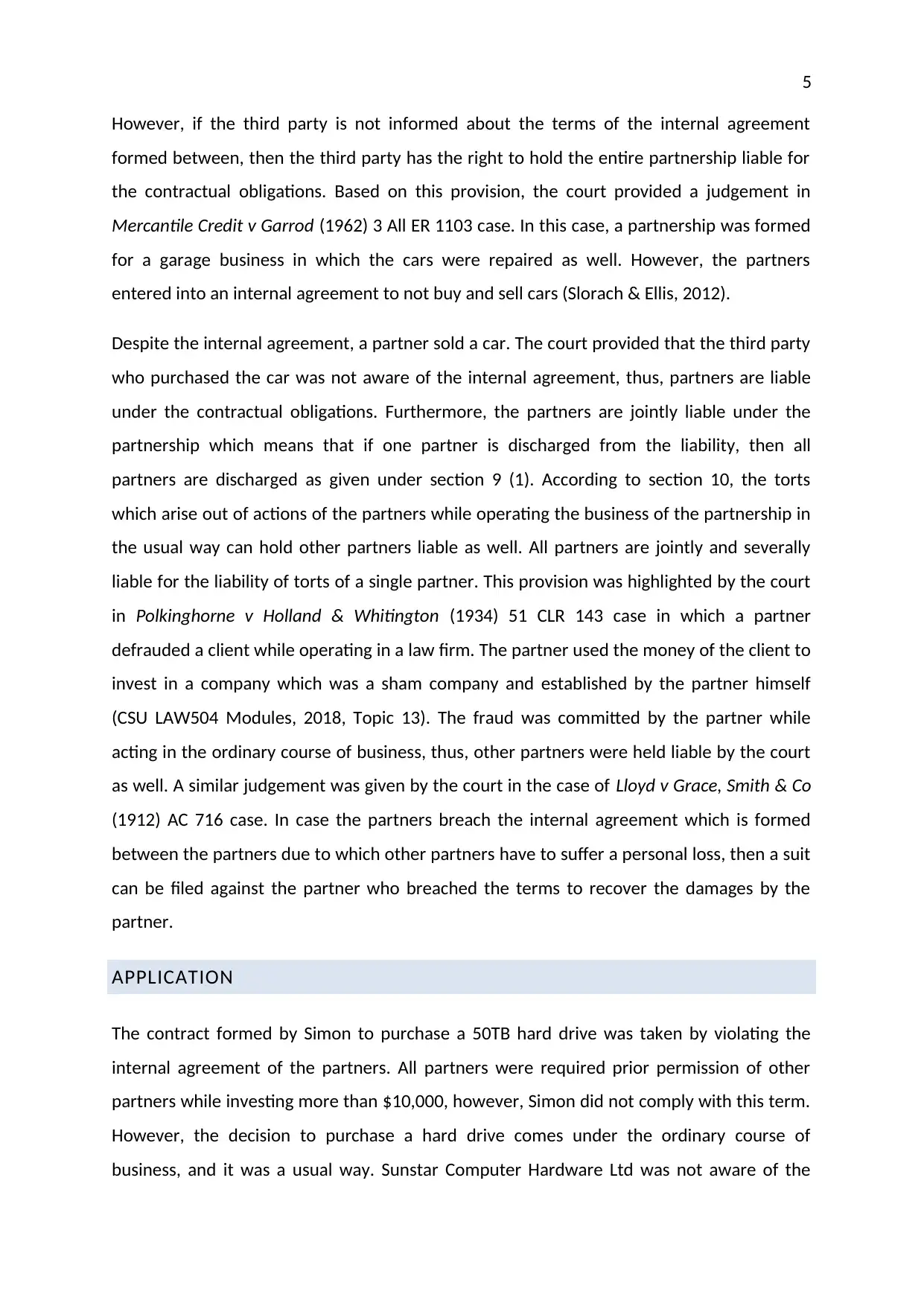
5
However, if the third party is not informed about the terms of the internal agreement
formed between, then the third party has the right to hold the entire partnership liable for
the contractual obligations. Based on this provision, the court provided a judgement in
Mercantile Credit v Garrod (1962) 3 All ER 1103 case. In this case, a partnership was formed
for a garage business in which the cars were repaired as well. However, the partners
entered into an internal agreement to not buy and sell cars (Slorach & Ellis, 2012).
Despite the internal agreement, a partner sold a car. The court provided that the third party
who purchased the car was not aware of the internal agreement, thus, partners are liable
under the contractual obligations. Furthermore, the partners are jointly liable under the
partnership which means that if one partner is discharged from the liability, then all
partners are discharged as given under section 9 (1). According to section 10, the torts
which arise out of actions of the partners while operating the business of the partnership in
the usual way can hold other partners liable as well. All partners are jointly and severally
liable for the liability of torts of a single partner. This provision was highlighted by the court
in Polkinghorne v Holland & Whitington (1934) 51 CLR 143 case in which a partner
defrauded a client while operating in a law firm. The partner used the money of the client to
invest in a company which was a sham company and established by the partner himself
(CSU LAW504 Modules, 2018, Topic 13). The fraud was committed by the partner while
acting in the ordinary course of business, thus, other partners were held liable by the court
as well. A similar judgement was given by the court in the case of Lloyd v Grace, Smith & Co
(1912) AC 716 case. In case the partners breach the internal agreement which is formed
between the partners due to which other partners have to suffer a personal loss, then a suit
can be filed against the partner who breached the terms to recover the damages by the
partner.
APPLICATION
The contract formed by Simon to purchase a 50TB hard drive was taken by violating the
internal agreement of the partners. All partners were required prior permission of other
partners while investing more than $10,000, however, Simon did not comply with this term.
However, the decision to purchase a hard drive comes under the ordinary course of
business, and it was a usual way. Sunstar Computer Hardware Ltd was not aware of the
However, if the third party is not informed about the terms of the internal agreement
formed between, then the third party has the right to hold the entire partnership liable for
the contractual obligations. Based on this provision, the court provided a judgement in
Mercantile Credit v Garrod (1962) 3 All ER 1103 case. In this case, a partnership was formed
for a garage business in which the cars were repaired as well. However, the partners
entered into an internal agreement to not buy and sell cars (Slorach & Ellis, 2012).
Despite the internal agreement, a partner sold a car. The court provided that the third party
who purchased the car was not aware of the internal agreement, thus, partners are liable
under the contractual obligations. Furthermore, the partners are jointly liable under the
partnership which means that if one partner is discharged from the liability, then all
partners are discharged as given under section 9 (1). According to section 10, the torts
which arise out of actions of the partners while operating the business of the partnership in
the usual way can hold other partners liable as well. All partners are jointly and severally
liable for the liability of torts of a single partner. This provision was highlighted by the court
in Polkinghorne v Holland & Whitington (1934) 51 CLR 143 case in which a partner
defrauded a client while operating in a law firm. The partner used the money of the client to
invest in a company which was a sham company and established by the partner himself
(CSU LAW504 Modules, 2018, Topic 13). The fraud was committed by the partner while
acting in the ordinary course of business, thus, other partners were held liable by the court
as well. A similar judgement was given by the court in the case of Lloyd v Grace, Smith & Co
(1912) AC 716 case. In case the partners breach the internal agreement which is formed
between the partners due to which other partners have to suffer a personal loss, then a suit
can be filed against the partner who breached the terms to recover the damages by the
partner.
APPLICATION
The contract formed by Simon to purchase a 50TB hard drive was taken by violating the
internal agreement of the partners. All partners were required prior permission of other
partners while investing more than $10,000, however, Simon did not comply with this term.
However, the decision to purchase a hard drive comes under the ordinary course of
business, and it was a usual way. Sunstar Computer Hardware Ltd was not aware of the
⊘ This is a preview!⊘
Do you want full access?
Subscribe today to unlock all pages.

Trusted by 1+ million students worldwide
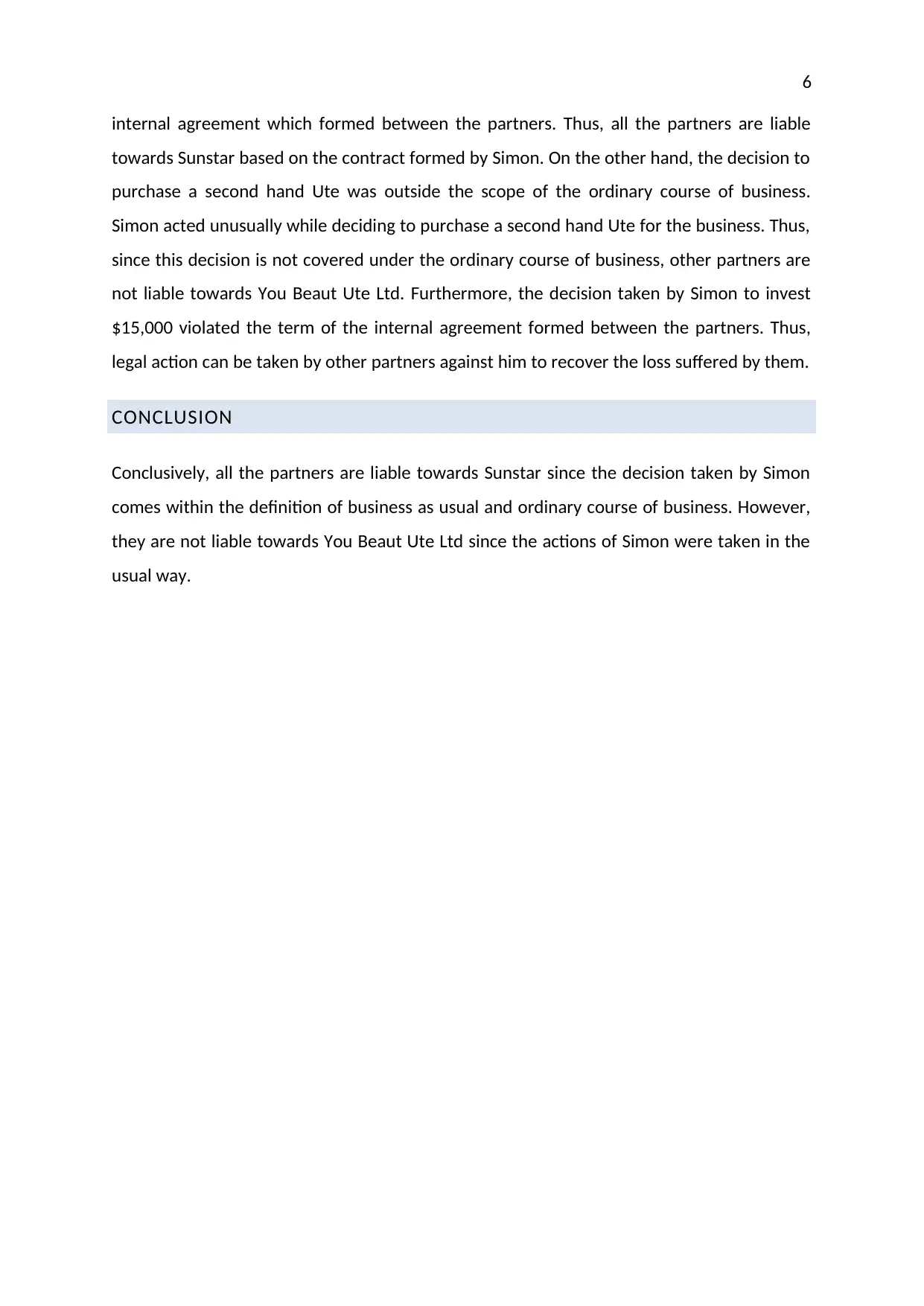
6
internal agreement which formed between the partners. Thus, all the partners are liable
towards Sunstar based on the contract formed by Simon. On the other hand, the decision to
purchase a second hand Ute was outside the scope of the ordinary course of business.
Simon acted unusually while deciding to purchase a second hand Ute for the business. Thus,
since this decision is not covered under the ordinary course of business, other partners are
not liable towards You Beaut Ute Ltd. Furthermore, the decision taken by Simon to invest
$15,000 violated the term of the internal agreement formed between the partners. Thus,
legal action can be taken by other partners against him to recover the loss suffered by them.
CONCLUSION
Conclusively, all the partners are liable towards Sunstar since the decision taken by Simon
comes within the definition of business as usual and ordinary course of business. However,
they are not liable towards You Beaut Ute Ltd since the actions of Simon were taken in the
usual way.
internal agreement which formed between the partners. Thus, all the partners are liable
towards Sunstar based on the contract formed by Simon. On the other hand, the decision to
purchase a second hand Ute was outside the scope of the ordinary course of business.
Simon acted unusually while deciding to purchase a second hand Ute for the business. Thus,
since this decision is not covered under the ordinary course of business, other partners are
not liable towards You Beaut Ute Ltd. Furthermore, the decision taken by Simon to invest
$15,000 violated the term of the internal agreement formed between the partners. Thus,
legal action can be taken by other partners against him to recover the loss suffered by them.
CONCLUSION
Conclusively, all the partners are liable towards Sunstar since the decision taken by Simon
comes within the definition of business as usual and ordinary course of business. However,
they are not liable towards You Beaut Ute Ltd since the actions of Simon were taken in the
usual way.
Paraphrase This Document
Need a fresh take? Get an instant paraphrase of this document with our AI Paraphraser
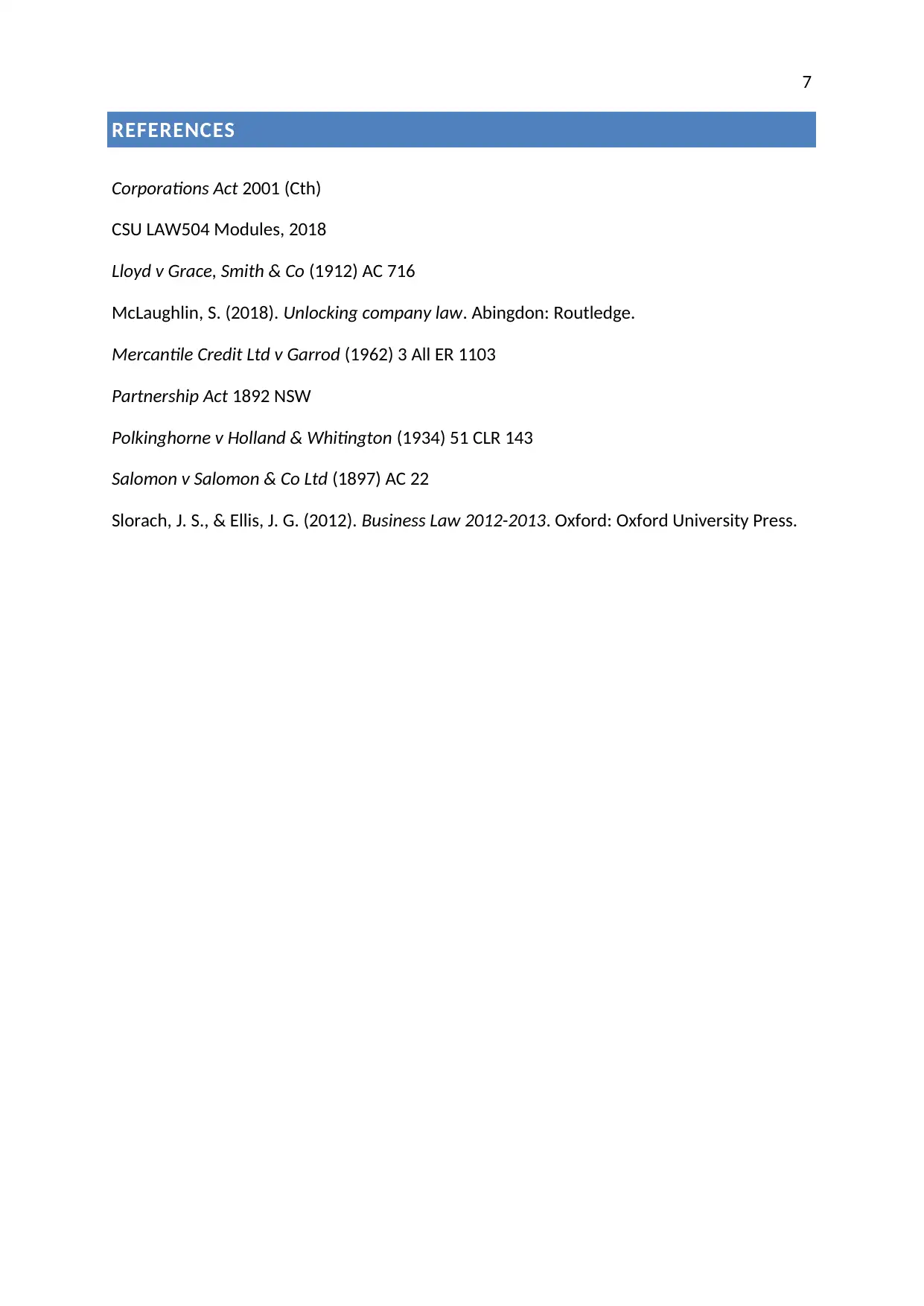
7
REFERENCES
Corporations Act 2001 (Cth)
CSU LAW504 Modules, 2018
Lloyd v Grace, Smith & Co (1912) AC 716
McLaughlin, S. (2018). Unlocking company law. Abingdon: Routledge.
Mercantile Credit Ltd v Garrod (1962) 3 All ER 1103
Partnership Act 1892 NSW
Polkinghorne v Holland & Whitington (1934) 51 CLR 143
Salomon v Salomon & Co Ltd (1897) AC 22
Slorach, J. S., & Ellis, J. G. (2012). Business Law 2012-2013. Oxford: Oxford University Press.
REFERENCES
Corporations Act 2001 (Cth)
CSU LAW504 Modules, 2018
Lloyd v Grace, Smith & Co (1912) AC 716
McLaughlin, S. (2018). Unlocking company law. Abingdon: Routledge.
Mercantile Credit Ltd v Garrod (1962) 3 All ER 1103
Partnership Act 1892 NSW
Polkinghorne v Holland & Whitington (1934) 51 CLR 143
Salomon v Salomon & Co Ltd (1897) AC 22
Slorach, J. S., & Ellis, J. G. (2012). Business Law 2012-2013. Oxford: Oxford University Press.
1 out of 8
Related Documents
Your All-in-One AI-Powered Toolkit for Academic Success.
+13062052269
info@desklib.com
Available 24*7 on WhatsApp / Email
![[object Object]](/_next/static/media/star-bottom.7253800d.svg)
Unlock your academic potential
Copyright © 2020–2026 A2Z Services. All Rights Reserved. Developed and managed by ZUCOL.





